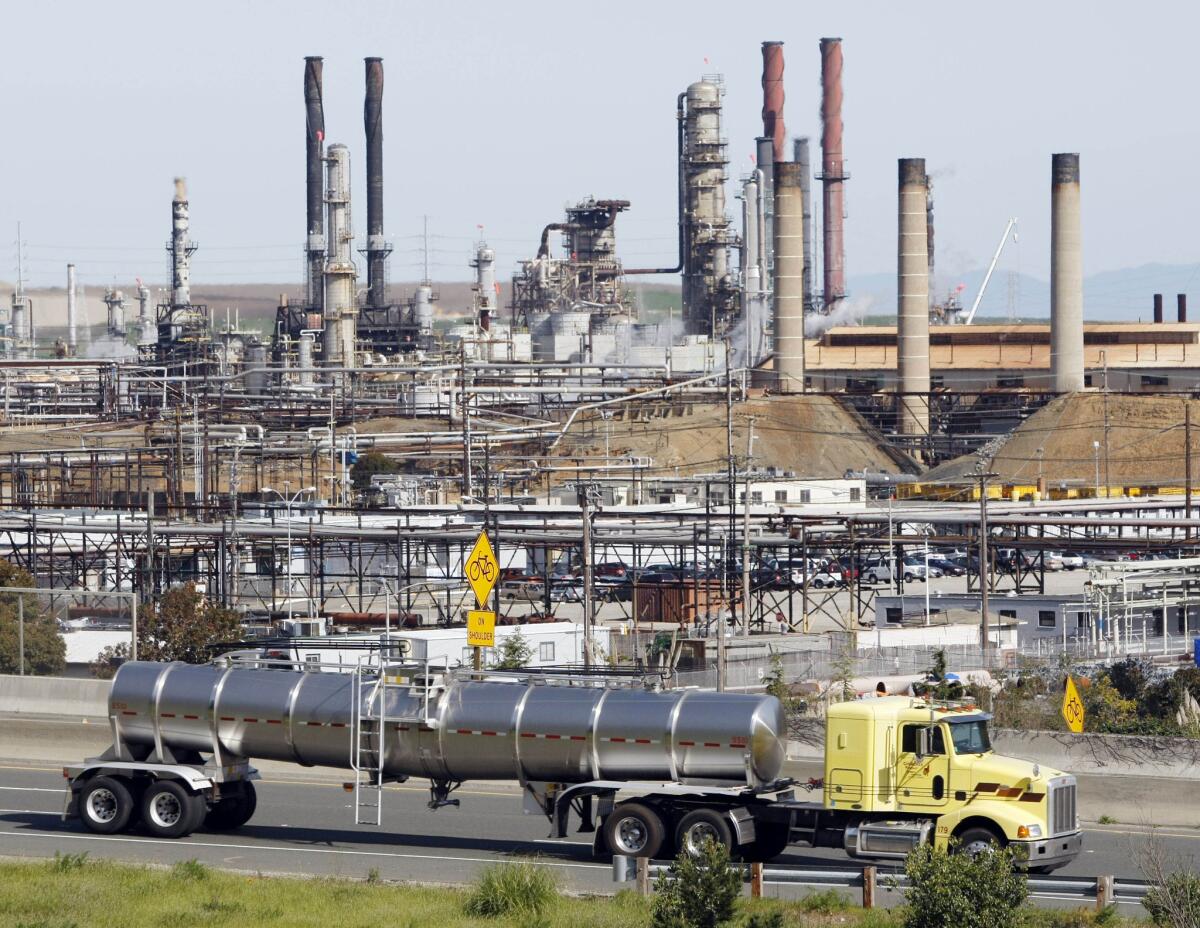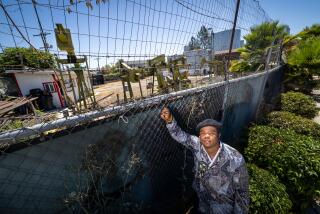A Chevron PR website pretends to be an objective news source

- Share via
If you happened to click Monday on the Richmond Standard, a community news site for that Bay Area locality, you would have come upon a fairly snarky piece about 170 activists (“some from Richmond”) who took a train cross-country to participate in the People’s Climate March in New York on Sunday.
“Talk about a disturbed climate,” the item began. It proceeded to describe how the activists were boisterous, rude, messy, and smelly -- enough to “rankle” the other passengers and even the conductors. All in all, a pretty negative picture of some of the participants in a rally that brought together 400,000 people (“some from Richmond”) to demand action on climate.
You might think this was an objective news report, unless you recognized that the Richmond Standard isn’t just another site for “community-driven news,” as it declares on its banner.
It’s entirely a creation of Chevron Corp., which operates a huge and controversial refinery in, yes, Richmond, and presumably doesn’t have the same view of climate change as the activists on the train.
This is what the news business has come to in communities where economics have wiped out traditional local newspapers. Self-interested corporations have stepped into the vacuum. You’d be hard-pressed to find a case as flagrant as Richmond’s.
“We have increasing numbers of dollars going into public relations of that sort,” says Ken Doctor, a media analyst at Newsonomics.com. “Today, everybody can be a publisher. The fact that this Richmond site looks like any other community news site is just a masquerade.”
We examined the consequences of corporate-produced “news” just last week, apropos of the National Football League and its homegrown NFL.com news site. The Financial Times also cited the Richmond Standard last week as a prime example of “the invasion of corporate news” into journalism. The San Francisco Chronicle raised questions about the Richmond Standard’s objectivity a few months ago.
Chevron’s PR department appears to be unfazed by the criticism. “The Richmond Standard’s a great resource for Richmond,” says Chevron spokeswoman Melissa Ritchie, who says it’s designed to deliver “amazing stories about the positive things that are happening here.”
She says Chevron took it upon itself to launch the site after hearing laments from local nonprofits that they didn’t have an outlet for Richmond news. When I asked if it might not have been better for Chevron to make a grant to an independent organization to open a news site -- or to nearby UC Berkeley, whose student-produced Richmond Confidential covers the community and could probably use some financial help -- she replied that the company thought “this was the best way to make sure the news was being covered.”
Mike Aldax agrees. He’s a former San Francisco Examiner reporter who constitutes the Standard’s entire staff -- “I work out of cafes and my car,” he says. He’s also an account executive at Singer Associates, the Chevron PR consultants that advised the company on the creation of the Richmond Standard.
“My function is to report the news you’re not seeing in Richmond,” he says. When the site was launched early this year, he adds: “We came out in the beginning and said, if you’re looking for a story that’s critical of Chevron, you’re not going to find it in the Richmond Standard.” That’s a pity, because there’s plenty of room for critical stories about Chevron, fires and pollution at the refinery among them. Chevron’s planned $1-billion refinery expansion, which is questioned by environmental experts, will generate possible news stories for years.
The site is “transparent” about its sponsorship, he says. That’s true, up to a point: The homepage states that it’s “brought to you by Chevron Richmond. We aim to provide Richmond residents with important information about what’s going on in the community, and to provide a voice for Chevron Richmond on civic issues.” Chevron corporate announcements are sequestered in a section labeled “Chevron Speaks.”
Is that sufficient disclosure? The answer is a resounding “no.”
“The disclosures don’t go very far to show how news can be corrupted,” says Ed Wasserman, a news media ethics expert who is dean of UC Berkeley’s Graduate School of Journalism.
The Standard may fill its pixels with items from the Richmond police blotter, community nonprofit nuggets, and coverage of the City Council committees, but “we don’t know what interests Chevron might have that dictate what gets covered and what doesn’t,” Wasserman says. “This is the world we’re increasingly inhabiting -- it’s increasingly difficult to identify sources of bias.” To Wasserman, the Standard’s diet of noncontroversial community news creates a deceptive atmosphere of community goodwill -- “and they can draw on that goodwill when something hits the fan.”
Aldax says Chevron doesn’t review or edit his stories, but it doesn’t have to. It provides his paycheck, and even subconscious self-censorship can undermine news gathering -- especially if one defines news as information its subject doesn’t want the public to know.
Chevron’s Ritchie was particularly proud of its response when a fire erupted at the refinery in July: Aldax received the same corporate statement that every other news agency got -- in other words, corporate flackery. If he were to start giving a creditable platform to the opponents of the refinery project, however, how long would he last?
The fatal flaw of the Richmond Standard is that it inevitably reflects the interests of its corporate sponsor. The novelist David Foster Wallace made the point best in his classic essay about a liner cruise, “A Supposedly Fun Thing I’ll Never Do Again,” when he was dismayed to find in the publicity brochure for Celebrity Cruises an essay by the distinguished author Frank Conroy about how much he had enjoyed his (expense-paid) Celebrity Cruise.
It was not a creative work but a commercial, Wallace felt, “like somebody who smiles warmly at you only because he wants something from you.” Wallace pondered “the cumulative effect that such dishonesty has on us; since it offers a perfect facsimile or simulacrum of goodwill without goodwill’s real spirit, it messes with our heads and eventually starts upping our defenses even in cases of genuine smiles and real art and true goodwill.”
That’s what the Richmond Standard does, on a less lofty scale. It will end by making its readers doubt that any news site exists without ulterior motives -- that any news organization has its readers’, not its owners’, interests at heart.
And then there’s the explanation that Conroy gave Wallace, when the latter called to ask why he wrote the thing: “I prostituted myself.”
Keep up to date with the Economy Hub by following @hiltzikm on Twitter.
More to Read
Inside the business of entertainment
The Wide Shot brings you news, analysis and insights on everything from streaming wars to production — and what it all means for the future.
You may occasionally receive promotional content from the Los Angeles Times.











